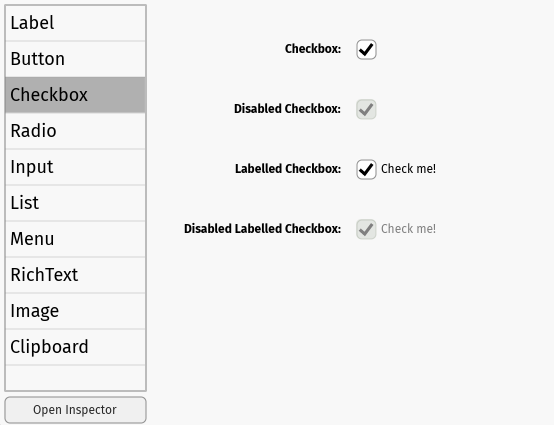The project is still maturing. We will make occasional breaking changes and add missing features on our way to v1.
use floem::{
reactive::create_signal,
views::{label, ButtonClass, Decorators},
IntoView,
};
fn app_view() -> impl IntoView {
// Create a reactive signal with a counter value, defaulting to 0
let (counter, set_counter) = create_signal(0);
// Create a vertical layout
(
// The counter value updates automatically, thanks to reactivity
label(move || format!("Value: {}", counter.get())),
// Create a horizontal layout
(
"Increment".class(ButtonClass).on_click_stop(move |_| {
set_counter.update(|value| *value += 1);
}),
"Decrement".class(ButtonClass).on_click_stop(move |_| {
set_counter.update(|value| *value -= 1);
}),
),
).style(|s| s.flex_col())
}
fn main() {
floem::launch(app_view);
}Inspired by Xilem, Leptos and rui, Floem aims to be a high performance declarative UI library requiring minimal user effort.
- Cross-platform support: Supports Windows, macOS and Linux with rendering using wgpu. In case a GPU is unavailable, a CPU renderer powered by tiny-skia will be used.
- Fine-grained reactivity: The entire library is built around reactive primitives inspired by leptos_reactive. The reactive "signals" allow you to keep your UI up-to-date with minimal effort, all while maintaining very high performance.
- Performance: The view tree is only run once, safeguarding you from accidentally creating a bottleneck in a view generation function that slows down your entire application. Floem also provides tools to help you write efficient UI code, such as a virtual list.
- Flexbox layout: Using Taffy, the library provides the Flexbox (or Grid) layout system, which can be applied to any View node.
- Customizable widgets: Don't want the default look? You can change pretty much anything you want using the styling API, or install a third-party theme.
- Element inspector: Inspired by your browser's developer tools, Floem provides a diagnostic tool to debug your layout.
To sample Floem's capabilities, check out the repo and run the widget gallery example with cargo.
To help you master Floem, we provide documentation and code examples.
Contributions welcome! If you'd like to improve how Floem works and fix things, feel free to open an issue or submit a PR. If you'd like a conversation with Floem devs, you can join in the #floem channel on this Discord.



